Premium Only Content
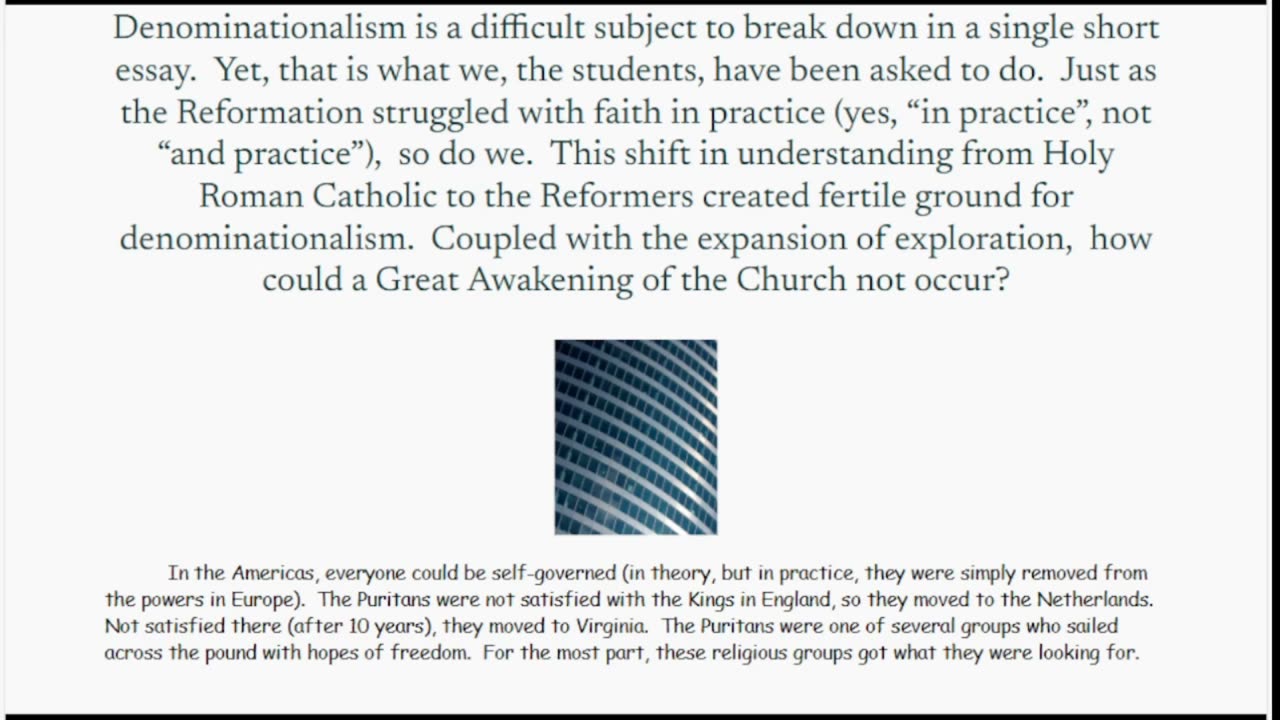
Can the Church Remain Unified While Becoming Divided
This week we analyze sectarianism and denominationalism. Shelley defines sectarianism as a group who “claims authority of Christ for itself alone.” Also, Shelley describes denominationalism as different groups of Christians being members of the whole group, namely the church. (pg 360). I understand this clarification of terms and find the definitions similar to what some presbyterians I know use. They agree with Shelley; denominational theory “insists that the true church cannot be identified with any single ecclesiastical structure.” (pg 360)
So, I ask, “What makes a Christian a Christian and not a heretic?” Is it the name on the sign outside or something more? I see some strengths and some weaknesses in denominationalism. But as far as the difference between sects and denominations are concerned, the difference lies with what is taught and adhered to within the walls of the group. Without looking at the specific group (and what they teach), how can we tell the difference between the two? We cannot. On the surface, they look the same.
As Dr. Harper points out around the 30 minute mark in the lecture, both sectarianism and denominationalism create division. The very word, denominationalism, is derived from denominator meaning to divide. Therefore, the weakness of this system is not unity, but division. With so many denominations and their practices, how does one know the true Gospel for faith and practice?
Denominationalism is a double-edged sword. The strength lies in the ability of those in the group to practice what they preach while remaining distinct, but the weakness lies therein, as well. Those outside the group, often, cannot tell the truth from lies.
Denominationalism is a difficult subject to break down in a single short essay. Yet, that is what we, the students, have been asked to do. Just as the Reformation struggled with faith in practice (yes, “in practice”, not “and practice”), so do we. This shift in understanding from Holy Roman Catholic to the Reformers created fertile ground for denominationalism. Coupled with the expansion of exploration, how could a Great Awakening of the Church not occur?
In the Americas, everyone could be self-governed (in theory, but in practice, they were simply removed from the powers in Europe). The Puritans were not satisfied with the Kings in England, so they moved to the Netherlands. Not satisfied there (after 10 years), they moved to Virginia. The Puritans were one of several groups who sailed across the pound with hopes of freedom. For the most part, these religious groups got what they were looking for.
The dreams of freedom and being governed by one’s own convictions was not possible in the European social model. King James in England is one example of that. Yes, I am aware he was king in the early 17th century, but we must set the stage for the Great Awakening and revivals of the 18th century. Once the new settlers arrived in the Americas, they set up their own governments and social structures. For the most part, they created a new model of society, separate and distinct from those in Europe. This duality creates the environment for the Great Awakening in the Americas and the mass revivals in Europe in 1730s and 1740s.
By now, we, the students, should be able to see history as a continuum. Nothing is isolated. The politics and social structures in Europe were different than in the Americas, and as such, the revivals were different. In the Americas, the emphasis was on the individual’s salvation and experience. In Europe the focus was on combating teachers like Voltaire and the Enlightenment. Both addressed the unique demands of the life and times of the people.
In closing, what worked in the Americas may not have worked in Europe, and vice versa. We would do well to exercise situational awareness when preaching the Gospel of Jesus Christ. As Paul instructs: let me be all things to everyone that I might win some.
90 & Out is a video commentary on the Christian Bible with new episodes uploaded periodically.
90 & Out is written, directed, and presented by Timothy Holt.
Timothy Holt serves as youth pastor at Six Points Church in Parker, PA and is the former children's pastor at Westdale Church in Cedar Rapids, IA. Timothy Holt believes the Christian Bible can be read easily but may take some effort to understand. With so many variations out there, how does one start their search for the truth? Hopefully, this channel will help you read and understand the Christian Bible more fully, as well as being entertained.
"The pursuit of knowledge is the beginning of wisdom" -ancient Jewish proverb
Get Merch @ https://www.stickermule.com/ce4c064d751047c
Or https://holtscountertops.etsy.com
Contact us @ [email protected]
On other platforms:
90 and Out on Facebook
https://www.facebook.com/share/r/15kWKTjtj6/
On Rumble
https://rumble.com/c/c-562805
On YouTube
https://www.youtube.com/@90out10
Thank you for watching this video and I hope it has impacted your life. Please subscribe for more video content. Comment, like, and share.
Or consider showing support with a monetary contribution using the PayPal link below.
https://www.paypal.com/ncp/payment/VD7ZP9QZB728U
All copyrights and trademarks are owned and retained by their respective holders.
Music was produced by Timothy Holt and is his sole intellectual property.
-
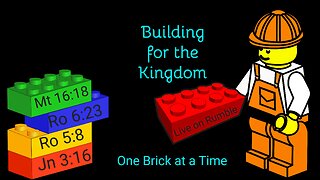 46:35
46:35
90 and Out
1 month agoBible Reading Plan and the Importance of Biblical Literacy
831 -
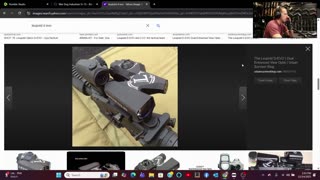 38:45
38:45
Tactical Advisor
2 hours agoQuitting my Job & Giveaway Winner! | Vault Room Live Stream 010
5.97K1 -
 LIVE
LIVE
ItzSufari
42 minutes ago🔴The Lords Sunday - Come join us in prayer - Amen
48 watching -
 LIVE
LIVE
BenderOdoyle
3 hours agoBO7 - with Friends, The Return
21 watching -
 17:17
17:17
Fit'n Fire
2 hours agoDraco Owners Won't Like This...Zastava M85 & M92 Are Better
362 -
 LIVE
LIVE
NSSKEnt
5 hours ago5 Mil Easy | Max Level EASY | ARC Raiders
29 watching -
 LIVE
LIVE
Sami Mikata
2 hours agoZombie Army 4 Dead War Live Stream
30 watching -
 52:02
52:02
MattMorseTV
3 hours ago $58.23 earned🔴It’s happened 4 TIMES in 48 HOURS.🔴
109K345 -
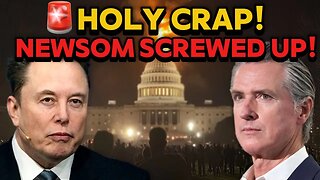 29:51
29:51
Stephen Gardner
20 hours agoYou'll NEVER Believe What Gavin Newsom Just Did to Elon Musk!
105K108 -
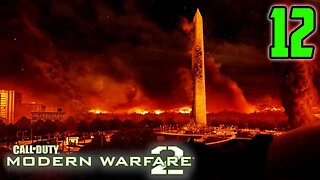 32:45
32:45
Degenerate Plays
6 hours agoJanuary 6th The Level? The Chinoman Needs Cortussy - Call of Duty: Modern Warfare 2 (2009) : Part 12
10